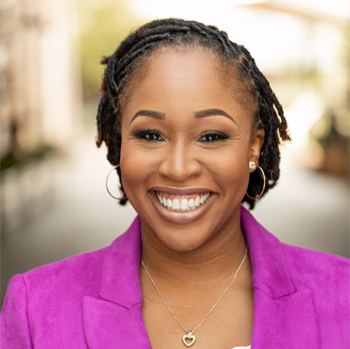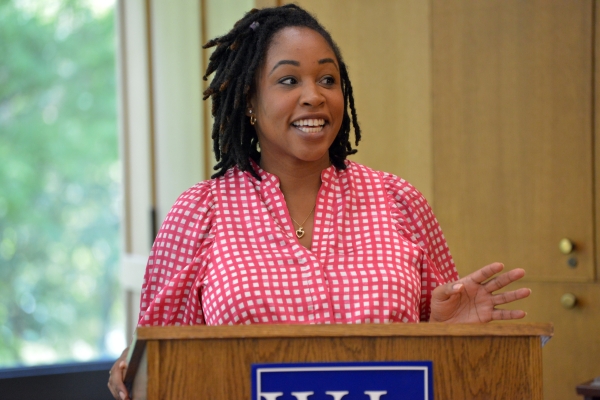Faculty Profile: Tammi Etheridge Tammi Etheridge is an expert in food and drug law with a talent for seeing both sides of complex issues.
After a year as a visiting professor, Tammi Etheridge joined W&L Law as a member of the permanent faculty this fall. Etheridge teaches in the areas of torts, administrative law, law and economics, and public health law. Her scholarship concerns the business of food and agriculture, its regulation, and questions of food accessibility. She received her J.D. degree and a Master of Public Policy from the University of Minnesota.
Etheridge knew she wanted to go to law school from a young age, learning “advocacy at the dinner table” as she lobbied her parents to let her do things her younger siblings were not allowed. “I felt injustice deeply, and as I got older that expanded to wanting to be a voice for others.” Etheridge attended the University of North Carolina at Chapel Hill for her undergraduate degree and then began her legal education at Minnesota.
Etheridge knew after the first semester that her ultimate professional goal was to be a law professor, but it was during her 1L summer working for medical device company Medtronic where she developed an affinity for tort law and products liability, particularly in the medical space. This experience set the stage for her early career in big law, where she represented major corporations like Boston Scientific and Johnson & Johnson. For Etheridge, working in-house and with large corporations initially gave her “the heart of a defense attorney.”
This perspective would broaden when Etheridge moved to West Virginia for a clerkship, a crucial step towards her ultimate goal of becoming a law professor. The judge assigned her his entire MDL (multi-district litigation) docket, which involved thousands of transvaginal mesh cases. She credits this exposure to the plaintiffs’ side of litigation with helping her develop greater empathy. “I had to see the rights and wrongs on both sides, and it gave me a humane perspective that I wouldn’t have naturally gained through my earlier practice,” she said.
This newfound empathy carried over into her next role when she transitioned to plaintiff-side tort law at a boutique firm in North Carolina. There, she dealt with catastrophic loss cases, drawing on the compassion and understanding she developed during her clerkship.
“I’m lucky to have practiced law and seen different sides of the law in various regions,” said Etheridge. “I have worked for clients who’ve dealt with the worst of situations and experienced profound loss, but also with defendants who haven’t done anything wrong and are simply pushing for innovation to improve health outcomes and save lives. Those experiences made me not only a better lawyer, but also a better human and certainly a better teacher.”
Etheridge moved into academia as a visiting assistant professor at Villanova, eventually teaching at Howard University and at Elon University before coming to W&L Law. She carved out her research and teaching niche by examining the ways in which tort law, legislation, and regulation work together for the betterment of society, specifically as it relates to food and drug law.
One of her most recent articles, “The Big Cost of Small Farms,” set to be published in the Florida Law Review, examines the Biden administration’s push to break up large agricultural companies. Etheridge argues that while large corporations often receive negative attention, they provide significant benefits to consumers by keeping food prices low. “There are large swaths of the country that can only afford food at big box stores like Walmart,” she explains, challenging the assumption that all big corporations are inherently harmful.
“Food is really interesting because it’s something that we experience with deep need,” said Etheridge. “It is personal for people, it is cultural, it is regional, it is necessary. And so I find myself writing most frequently in the food space about what producers and manufacturers are doing, and what the government is doing, and what implications that has for regular people.”
In another forthcoming article, “Policing Food Production,” Etheridge explores the attempts by states like Florida and Alabama to criminalize the sale of lab-grown meat. Etheridge questions the motivations behind these bans, which she believes prioritize traditional industries over public health benefits, while also seeking solutions that balance innovation with societal well-being.
“The reality is that there are times when business is good for us, and there are times when it needs to be checked,” said Etheridge. “And I think we don’t do a good job of discerning which is which because so much of it is political now. My goal is to pull politics out of it and help us get to the best answers for the people.”
Now beginning her second year as a member of the W&L Law community, Etheridge has been especially impressed by the work ethic of the students.
“Not only are the students deeply intelligent, but they’re willing to put in the work to back that up, which is a rare combination in my experience,” said Etheridge. “Their enthusiasm makes the teaching fun.”
If you know any W&L faculty who would be great profile subjects, tell us about them! Nominate them for a web profile.
 Professor Tammi Etheridge
Professor Tammi Etheridge Professor Tammi Etheridge
Professor Tammi Etheridge
You must be logged in to post a comment.